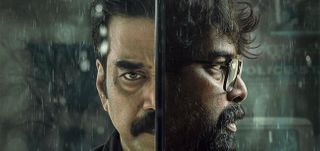
Bhagya Devatha Movie Review
Bhagya Devatha is more of a medieval morality play and less of a cinematic expedition that befits its times. Sathyan Anthikkad has put up an elongated allegory in which the protagonist comes across embodiments of an assortment of moral traits who try to persuade him to opt for a chaste life over one of vice.
Benny (Jayaram) is a Cable TV service provider in Kuttanad, who tries out every trick in the book to make both ends meet. His dreams smell of raw currency notes and his hopes are nothing short of unrealistic. Which is when he jumps at an opportunity to marry Daisy (Kaniha), blinded by the dowry that her dad guarantees. However, when the promise remains a mere proffering Benny has no qualms of throwing Daisy out of his home and heart. At least until, she wins a lottery.
Rajesh Jayaraman's story has nothing new-fangled to offer to a viewer who has been brought up with the cinema of the 70's and the 80's. An age when a new found resistance against the dowry deaths that rocked Kerala had found an expression in films, it had explored all the prospects that the theme offered. Rajesh pens an oft-written story yet again, throwing in an element of luck that sees the abandoned wife re-touching the rainbow. Sadly, it is exactly this aberration that ruins the film beyond repair.
One has to analyze the Anthikkadan society that subsists on the brink of a fantasy. Set in Kottayam or Kuttanad, Kollam or Kumili, the societal framework in Sathyan's several films in the last few years brag of a mutual harmony that's almost pastoral. Religion does have a major say it seems, with the respective emblems, be it Hindu or Christian showcased to perfection. So much so, that the Muslim family in the neighborhood has almost turned out to be the Sathyan stamp, that habitually leads to an Oppana (a Duff Muttu in this case), sooner or later.
The Anthikkadan hero too has been caught in a web of personal defeats and dilemmas. There is simply no scope for an external villain to create havoc here. His hero wages an internal battle, with scores of angels hovering all around, reprimanding him to go the right way. And he struggles, strains, falters and fails before he gathers himself up and sets himself straight on the path to regret and repentance.
The critical social commentary runs along the entire length of the film. There is evidently no escape from the digs at Communism, the chit fund scams, bank loans, communal conversions, polygamy and what not. There is an inter caste marriage, sermons on the sanctity of the marital chord, and even a remark on the impact of recession on the IT industry. On several occasions, the film itself reminded me of those several people who barge into a conversation between Benny and Daisy at the latter's office. It has an opinion, regardless of whether its audience would actually be pleased to lend an ear or not.
To make Benny see sense, his ideology is used as a boomerang. Caught in dire straits when demanded a heavy dowry for his sister's wedding, Benny is rendered penitent. What you do, comes back to you, says Bhagyadevatha; takers anyone? It's paradoxical that the film adopts a solid stand against the lust for money, and yet it cannot be denied that it's the lure of two crores that drives Benny to atonement. Fundamentally, he is still a chap who would crawl on all fours to grab that rolling coin. And sans the lottery win, Daisy holds no fragrance for the man.
Performances from the lead actors are consistently first-rate. Jayaram is quite at ease doing what he does best. Kaniha is aptly cast as Daisy, and should hopefully be around for at least a while. Narein in the assumedly-the-other-guy role has pretty much little to do. And Samvrutha in a cameo looks exquisite. Chembil Ashokan (had to wait till the credits rolled to find out the name of this gifted actor) is a revelation. I'm sure we would see more of this actor in the days to come. As is always the case, Illaiyaraja's tunes are lilting to say the least. And it's wonderful to see Venu back with a bang. The splendor or what's left of it, of Kuttanad is captured in all its grandeur by the acclaimed cinematographer.
Here is a tale that's as old as the hills. Told in a manner that's as inert as tedium can be. And to top it all, it's preachy and didactic, leaving the exasperated viewer with practically nothing to chew on.
OTHER REVIEWS



















